You are viewing the Cultures of Knowledge Blog archive for the ‘Events’ Category:
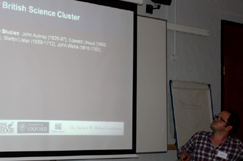
James introduces the Project.
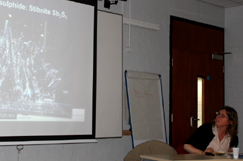
Anna Marie describes stibnite.
The Project was on the road again this week, this time at the venerable Reading Conference in Early Modern Studies, which this year took as its theme ‘Communication and Exchange’ (University of Reading, 18−20 July 2011). On Monday afternoon, a panel devoted to CofK comprised three interlocking papers. Project Coordinator James Brown provided an overview of the Project and its intellectual objectives, Research Fellow Anna Marie Roos delivered a wonderful case study of Martin Lister‘s hitherto unsung contributions to Newtonian telescopy, while Editor Kim McLean Fiander introduced our union catalogue of early modern correspondence and treated delegates to a sneak preview of its editorial and search interfaces. In the evening, Project Director Howard Hotson concluded our contribution with a plenary address on the multi-layered network of Samuel Hartlib. In a wide-ranging analysis, Howard recapitulated some of the broader objectives of the Project, before describing the way in which Hartlib’s legendary intelligencing both superimposed and reflected the pedagogical, diplomatic, commercial, and military networks engendered by the upheavals of the Thirty Years War. For more information about the conference, please download the programme (pdf).
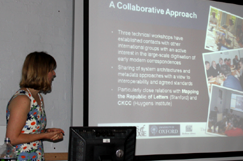
Kim introduces the catalogue.
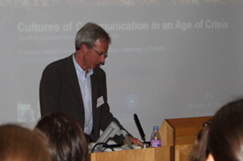
Howard's keynote on Hartlib.
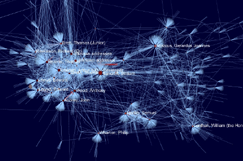
The CofK network at-a-glance.
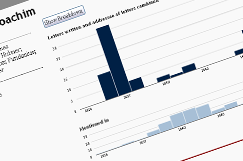
New interactive bar charts.
Further to our report on Scott Weingart‘s visit and presentation on Visualizing and Navigating the Republic of Letters, here’s a quick update on some of the fruits of his labours. During the week he was with us, Scott worked intensively with our developer community at BDLSS to implement some visual respresentations of the metadata assembled in our union catalogue of early modern correspondences, and the team produced some lovely deliverables within record time. The first are some revealing social network visualizations of the relationships between the 11,284 correspondents currently on the system, created with the Gephi graphics package. The second are some interactive, in-browser bar charts for display on person profile pages, displaying at-a-glance the number of letters sent, received, and mentioned in, created with the d3.js javascript library… and there’s more to come. At-a-glance representations such as these will radically improve the legibility and navigability of our records for end users, so a thank you to Scott for sharing his expertise with us. A public beta of the union catalogue will be available in the autumn.
Update: Preview some preliminary results
We are fortunate to have with us this week Scott Weingart, a former student of Robert A. Hatch and an up-and-coming visualization expert from Indiana University‘s Cyberinfrastructure for Network Science Center. Following on from a workshop at Mapping the Republic of Letters (Stanford) and a three-month stint at CKCC (Huygens Institute), Scott will be spending time with our union catalogue development team at BDLSS, raising awareness of the various techniques and technologies available for representing and visualizing large epistolary datasets. Scott kicked off his stay with a well-attended presentation on ‘Analyzing, Visualizing, and Navigating the Republic of Letters’ on Monday 11 July. In a two-part discussion, Scott provided a general introduction to the many uses and histories of visualizations, before describing in detail the various software packages and data formats necessary for implementation. Both of Scott’s talks can be watched again below; you can also ‘click along’ with his slides.
Part I: Introduction
Part II: Implementation
James Brown
July 13, 2011
Conferences and Workshops, Events, Project Updates
Tags: Databases, Digitization, Europe, Geography, Global, Networks, Spatial Theory, Visualization
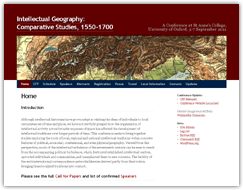
We are pleased to announce that booking is now open for Intellectual Geography: Comparative Studies, 1550-1700, the second Project conference, which will take place at St Anne’s College, Oxford, on 5-7 September 2010. Organised by Howard Hotson, the event brings together case studies and digital projects exploring the roots of local, regional, and national intellectual traditions and networks within concrete features of political, economic, confessional, and physical geography. For provisional programme information, a steadily growing lists of speaker profiles and abstracts, and to book online, please visit the conference website. The deadline for registrations is Wednesay 31 August.
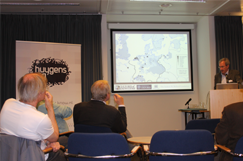
Project Director Howard Hotson opens our talk with some Hartlibian background.
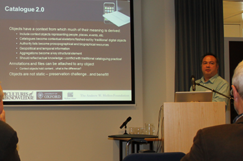
Our technical lead Neil Jefferies describes 'Catalogue 2.0'.
Last week provided us with another opportunity to share the Project, specifically its union catalogue and associated editorial tools, at the international conference Representing the Republic of Letters (The Hague, 30 June–1 July 2011). Organised by our partners and good friends CKCC in the congenial surroundings of the recently renamed Huygens ING, and held in conjunction with the Descartes Centre at Utrecht University, the event showcased the fascinating work being undertaken by various individuals and projects worldwide to represent early modern correspondence networks and their constituent components digitally and visually. General sessions devoted to funding and standards facilitated ongoing collaborative discussions between CofK, our hosts, and Mapping the Republic of Letters (Stanford), who also presented at the event.
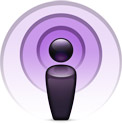 Podcasts of most of the papers in our 2010 and 2011 seminar series, ‘Cultures of Knowledge in Early Modern Europe’, are now available for playing and download on the Project website. The international cast is glittering and the range of correspondence-related topics broad, so please do fire up your speakers and mobile devices. To hear last year’s papers, see the 2010 seminar page; to hear this year’s papers, see the 2011 seminar page. Happy listening!
Podcasts of most of the papers in our 2010 and 2011 seminar series, ‘Cultures of Knowledge in Early Modern Europe’, are now available for playing and download on the Project website. The international cast is glittering and the range of correspondence-related topics broad, so please do fire up your speakers and mobile devices. To hear last year’s papers, see the 2010 seminar page; to hear this year’s papers, see the 2011 seminar page. Happy listening!










 Podcasts of most of the papers in our 2010 and 2011 seminar series, ‘Cultures of Knowledge in Early Modern Europe’, are now available for playing and download on the Project website. The international cast is glittering and the range of correspondence-related topics broad, so please do fire up your speakers and mobile devices. To hear last year’s papers, see the
Podcasts of most of the papers in our 2010 and 2011 seminar series, ‘Cultures of Knowledge in Early Modern Europe’, are now available for playing and download on the Project website. The international cast is glittering and the range of correspondence-related topics broad, so please do fire up your speakers and mobile devices. To hear last year’s papers, see the 
 Join
Join 